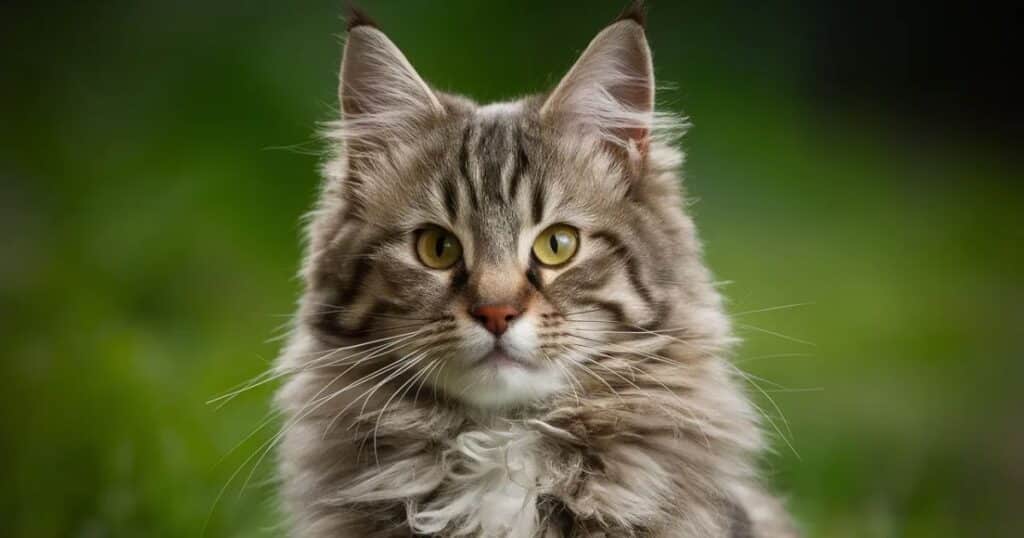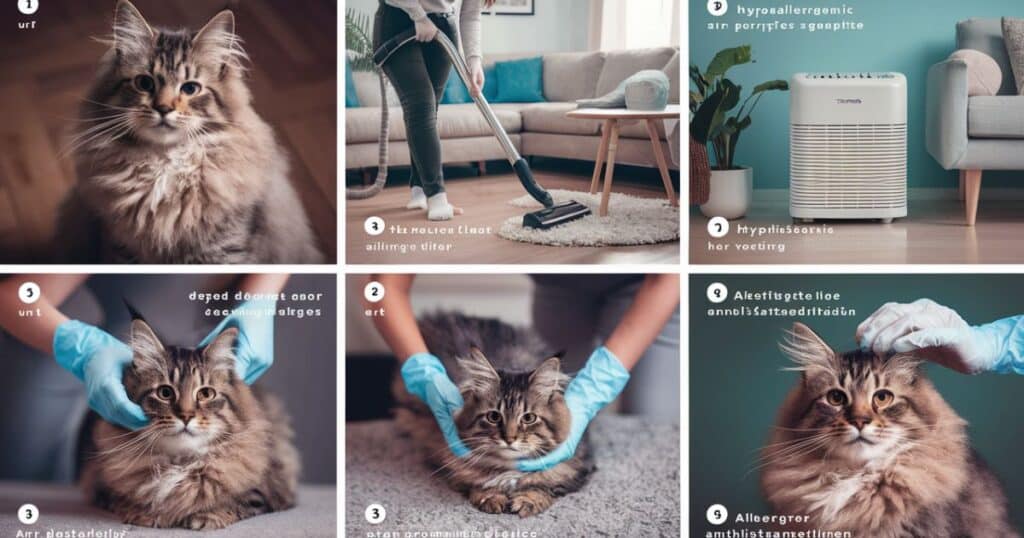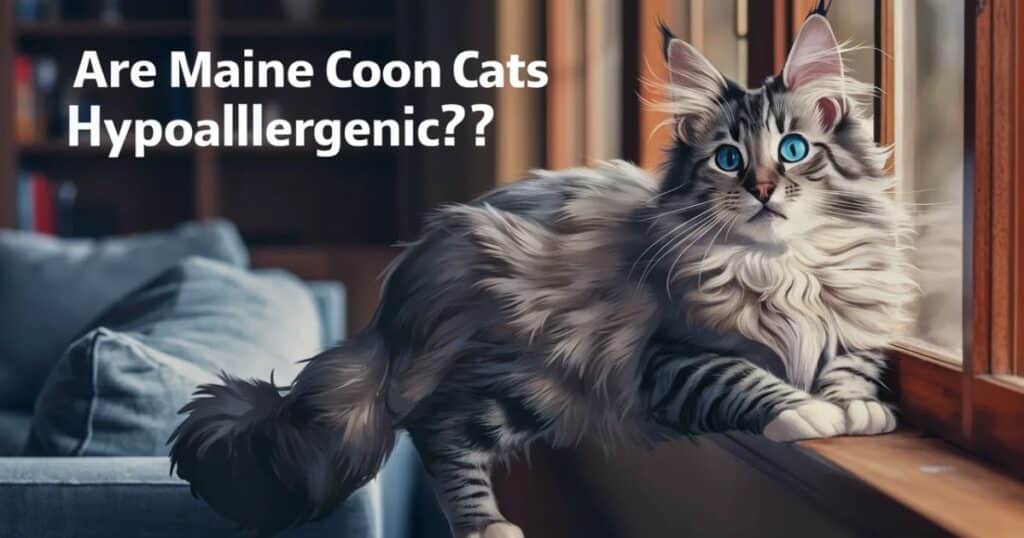If you’re a cat lover considering adding a feline companion to your family but suffer from pet allergies, you’ve likely encountered the term “hypoallergenic cats.” The Maine Coon, with its distinctive appearance and friendly personality, is a popular cat breed often touted as hypoallergenic. However, the truth is a bit more nuanced.
In this comprehensive guide, we’ll explore whether Maine Coon cats are truly hypoallergenic, bust common myths, and provide allergy management strategies for allergy-prone humans interested in owning one of these magnificent felines.
What Does Hypoallergenic Mean for Cats?
The term “hypoallergenic” refers to products or animals that are less likely to cause an allergic reaction in individuals with allergies. However, it’s important to note that there is no such thing as a 100% hypoallergenic cat breed. All cats produce the Fel d1 protein, which is the primary allergen responsible for triggering cat allergies in humans.
While some cat breeds may produce lower levels of this protein or have fur coats that shed less, they still have the potential to cause allergic reactions in sensitive individuals. The term “hypoallergenic” is often misleading when applied to cats, as it suggests the possibility of an allergy-free experience, which is rarely the case.
Are There Hypoallergenic Cats?

While no cat breed is truly hypoallergenic, some varieties are considered more allergy-friendly than others. These include:
- Siberian cats: Known for producing lower levels of the Fel d1 protein.
- Balinese cats: With their long, silky fur coats, they are believed to produce fewer allergens.
- Russian Blue cats: Their double coat is thought to trap more allergens within the fur.
- Hairless Sphynx cats: With minimal hair, they may produce fewer airborne allergens.
It’s essential to note that even these specific cat breeds can still trigger allergic reactions in sensitive individuals. The level of allergen exposure and an individual’s sensitivity play significant roles in determining the severity of the allergic response.
ALSO READ: How Much Does A Maine Coon Cat Cost In 2024?
Are Maine Coon Cats Hypoallergenic?
Unfortunately, Maine Coon cats are not considered hypoallergenic. While their long hair and double coat may initially seem like a deterrent for allergy sufferers, these traits can actually contribute to higher levels of allergen exposure.
Why Aren’t Maine Coons Hypoallergenic?
- Shedding: Maine Coons are known for their substantial shedding, particularly during seasonal changes. This increased shedding can lead to higher levels of dander and allergens in the environment.
- Coat Type: The Maine Coon’s double coat consists of a dense undercoat and a longer, water-resistant topcoat. While this coat is beautiful, it can trap and distribute more allergens throughout the home.
- Fel d1 Protein: Like all cats, Maine Coons produce the Fel d1 protein, which is the primary allergen responsible for triggering cat allergies in humans.
What If I Still Want a Maine Coon?
If you have your heart set on owning a Maine Coon cat but suffer from cat allergies, there are steps you can take to minimize your exposure to allergens and manage your symptoms effectively. The following sections will provide valuable insights and prevention tips to help you coexist with your feline friend.
Understanding Cat Allergies
Before diving into strategies for managing cat allergies, it’s essential to understand what causes these allergic reactions and their common symptoms.
What Causes Cat Allergies?
Cat allergies are typically triggered by exposure to specific proteins found in:
- Cat dander: Microscopic flakes of skin shed by cats.
- Cat saliva: Proteins present in a cat’s saliva can cause allergic reactions when transferred to surfaces through grooming or licking.
- Cat urine: Certain proteins in cat urine can also act as allergens.
These proteins, particularly the Fel d1 protein, are recognized by the immune system as foreign invaders, prompting an allergic response.
Signs of Cat Allergies
Common symptoms of cat allergies include:
- Sneezing
- Runny or stuffy nose
- Itchy, watery eyes
- Coughing or wheezing
- Skin rashes or hives
- Asthma attacks (in severe cases)
If you experience these symptoms after repeated exposure to cats, it’s likely that you have cat allergies.
How to Check if You Are Allergic to Maine Coons
If you’re considering bringing a Maine Coon cat into your home, it’s crucial to confirm whether you are allergic to this specific cat breed. Here are two recommended methods:
Interaction with Maine Coon
Spend an extended period of time around a Maine Coon cat, ideally in a home where one resides. Observe if you experience any allergic symptoms during or after this interaction.
Visit an Allergist
For a professional assessment, consult an allergist who can perform skin or blood tests to determine your sensitivity to cat allergens, including those specific to the Maine Coon breed.
When to See a Doctor
While cat allergies are generally not life-threatening, they can significantly impact your quality of life and, in severe cases, lead to respiratory complications. If you experience persistent or severe symptoms, seek medical attention from a qualified healthcare professional. They can provide proper diagnosis, recommend allergy medication, and offer guidance on managing your condition.
How to Minimize Maine Coon Cat Allergies

If you’ve confirmed that you can tolerate a Maine Coon cat with proper management, the following strategies can help minimize your exposure to allergens and alleviate your allergy symptoms.
Caring for Your Cat
Implementing a few simple practices in your cat’s care routine can significantly reduce the amount of allergens in your home.
Brush & Bathe Your Cat Regularly
Regular brushing and bathing can help remove loose hair, dander, and saliva from your cat’s coat, reducing the amount of airborne allergens. Aim to brush your Maine Coon at least once a week and bathe them every 4-6 weeks.
Use Anti-Allergen Spray
Consider using anti-allergen sprays or wipes designed specifically for pets. These products can help neutralize allergens on your cat’s coat and reduce the amount of dander and saliva dispersed into the environment.
Change the Litter Tray Regularly
Allergens can accumulate in your cat’s litter tray, so it’s essential to clean and replace the litter frequently. Aim to scoop the tray daily and replace the litter entirely once a week.
Supplements for Cats
Some cat owners have reported success in reducing allergen levels by supplementing their cats’ diets with omega-3 fatty acids, probiotics, or other supplements designed to reduce shedding and dander production.
Home Environment
Creating an allergy-friendly home environment can significantly reduce your exposure to cat allergens and provide relief for your symptoms.
Clean Your Home Frequently
Regular cleaning, vacuuming, and dusting can help remove pet dander, hair, and other allergens from surfaces and the air. Consider investing in a vacuum cleaner with a HEPA filter to capture smaller particles more effectively.
Install Air Filters
High-efficiency particulate air (HEPA) filters can trap airborne allergens, improving indoor air quality. Place these filters in rooms where your cat spends the most time or install them in your HVAC system.
Create a Designated Cat-Free Zone
Establish at least one room or area in your home as a cat-free sanctuary. Keep the door closed and use HEPA air purifiers to maintain a low-allergen environment where you can retreat if needed.
Owner Self-Care
In addition to managing your home environment, implementing personal practices can help minimize your exposure to cat allergens and alleviate your allergy symptoms.
Wash Your Hands Often
Make a habit of washing your hands thoroughly with soap and water after handling your cat, their toys, or bedding. This simple step can prevent allergens from spreading and reduce your risk of an allergic reaction.
Minimize Petting Your Cat
While it’s tempting to shower your feline friend with affection, excessive petting can increase your exposure to dander and saliva. Try to limit direct contact, especially around your face, and consider wearing protective clothing like long sleeves when playing with your Maine Coon.
Don’t Let Your Cat Lick You
As tempting as those kitty kisses may be, allow your cat to lick you. The proteins in their saliva can trigger allergic reactions, so it’s best to avoid letting them lick your skin or face.
Use Gloves While Gardening
If your Maine Coon spends time outdoors or in the garden, wear gloves when working in those areas. Cat allergens can accumulate in soil and vegetation, increasing your risk of exposure.
Take Anti-Allergy Medication
Over-the-counter or prescription allergy medication can help alleviate your symptoms when exposure to cat allergens is unavoidable. Consult with your healthcare provider to find the most suitable option for your needs.
Additional Tips and FAQ
Do Maine Coons Shed a Lot?
Yes, Maine Coon cats are known for their substantial shedding, particularly during seasonal changes. Their thick double coat ensures they shed heavily in the spring and fall as they adapt to changing temperatures. Regular brushing and grooming can help manage the shedding and reduce the amount of loose hair and dander in your home.
Can I Just Make My Maine Coon an Outdoor Cat?
While keeping your Maine Coon strictly outdoors may seem like a solution to reducing allergen exposure indoors, it’s generally not recommended. These cats thrive on human companionship and interaction, and outdoor living can expose them to various risks, including weather extremes, predators, and potential injuries or illnesses.
If you decide to keep your Maine Coon primarily outdoors, ensure they have a secure, weatherproof shelter and access to fresh water and food. Additionally, consider providing them with a safe, enclosed outdoor space or “catio” to enjoy the outdoors while minimizing risks.
Frequently Asked Questions About Maine Coon Cats
Different Types of Maine Coon Cats (Black, White, Gray, Orange, Black and White)
Maine Coon cats come in a variety of colors and patterns, including:
- Black
- White
- Gray
- Orange
- Black and White
- Cream
- Calico
- Tabby
While their coat colors may vary, all Maine Coons share the same breed characteristics, including their distinctive size, tufted ears, and semi-long, shaggy coats.
How Much Does a Maine Coon Cat Cost?
The cost of a Maine Coon cat can vary depending on factors such as the breeder, location, age, and pedigree. On average, you can expect to pay anywhere from $600 to $2,000 for a kitten from a reputable breeder. However, adoption fees from shelters or rescues are typically much lower, ranging from $100 to $300.
How to Tell if Your Cat is a Maine Coon?
If you’ve adopted or acquired a cat and are unsure if it’s a Maine Coon, look for these distinctive physical traits:
- Large size (males can reach up to 18 pounds)
- Rectangular body shape
- Tufted ears with lynx-like tips
- Large, brushy tail
- Semi-long, shaggy coat with a ruff around the neck
You can also have your veterinarian or a cat fancier organization assess your cat’s breed characteristics.
What Do Maine Coon Cats Eat?

Maine Coon cats are large, active felines with high nutritional needs. They thrive on a diet that includes:
- High-quality, protein-rich cat food (wet or dry)
- Supplemental protein sources like cooked chicken or fish
- Fresh, clean water at all times
Avoid overfeeding your Maine Coon, as they can be prone to obesity. Consult with your veterinarian to determine the appropriate portion sizes and dietary requirements for your individual cat.
How Long Do Maine Coon Cats Live?
With proper care and a healthy lifestyle, Maine Coon cats have an average lifespan of 10 to 13 years. However, many Maine Coons have been known to live well into their late teens or even early twenties.
Providing a nutritious diet, regular veterinary check-ups, and a safe, enriching environment can help maximize your Maine Coon’s longevity and quality of life.
Where Do Maine Coon Cats Come From?
The Maine Coon is one of the oldest natural breeds in North America, with origins dating back to the early 19th century in the state of Maine. Their name likely derives from their raccoon-like appearance, with their bushy tails and tufted ears.
While their exact ancestry is unknown, some theories suggest that Maine Coons may be descendants of long-haired cats brought to New England by early settlers or even Vikings.
Conclusion
While Maine Coon cats are not truly hypoallergenic, their endearing personalities and striking appearances make them a desirable choice for many cat lovers. By understanding the nature of cat allergies, implementing proper management strategies, and seeking professional medical advice when needed, allergy sufferers can often enjoy the companionship of these magnificent felines.
Remember, regular grooming, frequent cleaning, and minimizing direct contact can significantly reduce your exposure to allergens. Additionally, creating an allergy-friendly home environment and taking allergy medication as recommended by your healthcare provider can help alleviate symptoms and improve your quality of life.
With patience, diligence, and a willingness to adapt, allergic individuals can often coexist harmoniously with their beloved Maine Coon companions. Embrace the journey, and cherish the unique bond that can form between human and feline, even in the face of allergic sensitivities.
ALSO READ THIS POST: Do Maine Coon Cats Shed? – The Ultimate Guide To Managing Their Magnificent Coats

Davin Connor is an experienced author with 3 years in pets writing. Known for concise, informative content, he shares expertise on pet care, behavior, and health through his engaging articles.






